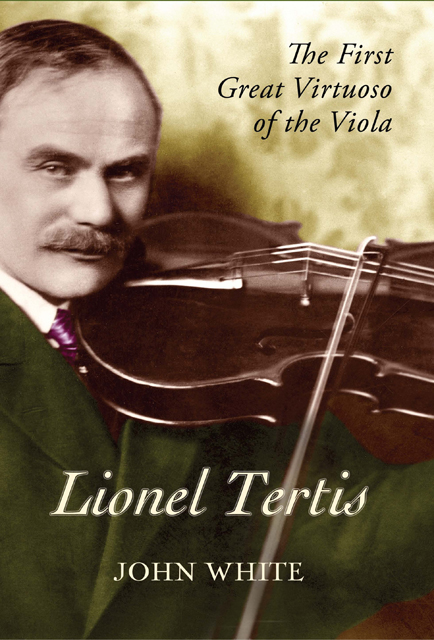Book contents
- Frontmatter
- Dedication
- Contents
- List of illustrations
- Foreword
- Preface
- Acknowledgements
- 1 The Tertis Family
- 2 Early Career
- 3 The Great War
- 4 The Chamber Music Players
- 5 American Tours
- 6 Return to the Royal Academy of Music
- 7 The Elgar and Walton Concertos
- 8 The BBC Orchestra, Delius, Bax and Vaughan Williams
- 9 A Shock Retirement
- 10 The Richardson–Tertis Viola
- 11 The Second World War
- 12 Promoting the Tertis Model Viola
- 13 Return to America and Eightieth Birthday Celebrations
- 14 Second Marriage and Last Appearance
- 15 TV Profile and Ninetieth Birthday
- 16 Final Years
- Notes
- Appendix 1 Tertis’s Violas
- Appendix 2 The Tertis Model Viola
- Appendix 3 Tertis’s Writings and Talks
- Appendix 4 Tertis’s BBC Appearances
- Appendix 5 Tertis’s Honours
- Appendix 6 Music with Tertis Connections
- Appendix 7 The Tertis Bequest
- Appendix 8 The Tertis Legacy
- Discography
- Bibliography
- Index
12 - Promoting the Tertis Model Viola
Published online by Cambridge University Press: 18 March 2023
- Frontmatter
- Dedication
- Contents
- List of illustrations
- Foreword
- Preface
- Acknowledgements
- 1 The Tertis Family
- 2 Early Career
- 3 The Great War
- 4 The Chamber Music Players
- 5 American Tours
- 6 Return to the Royal Academy of Music
- 7 The Elgar and Walton Concertos
- 8 The BBC Orchestra, Delius, Bax and Vaughan Williams
- 9 A Shock Retirement
- 10 The Richardson–Tertis Viola
- 11 The Second World War
- 12 Promoting the Tertis Model Viola
- 13 Return to America and Eightieth Birthday Celebrations
- 14 Second Marriage and Last Appearance
- 15 TV Profile and Ninetieth Birthday
- 16 Final Years
- Notes
- Appendix 1 Tertis’s Violas
- Appendix 2 The Tertis Model Viola
- Appendix 3 Tertis’s Writings and Talks
- Appendix 4 Tertis’s BBC Appearances
- Appendix 5 Tertis’s Honours
- Appendix 6 Music with Tertis Connections
- Appendix 7 The Tertis Bequest
- Appendix 8 The Tertis Legacy
- Discography
- Bibliography
- Index
Summary
CBE – promoting the T.M. – Wilfred Saunders – death of Ada – move to Devon – Dartington – Lillian Warmington
In January 1950 Tertis declared himself ‘greatly honoured’ when King George VI appointed him Commander of the Order of the British Empire (CBE) ‘for services to music, particularly in relation to the viola’. Sadly Ada, who had been ailing for some six years, was in a nursing home at the time, and could not accompany him to Buckingham Palace to receive the honour from the King. Tertis therefore asked Charles Lovett Gill to go with him. Later in the year the committee of the Musicians’ Benevolent Fund conferred an award on him that also proved dear to his heart; Tertis received the news in a letter, dated 30 October, from the chief critic of The Times, Frank Howes, chairman of the fund:
It gives me pleasure to write and tell you that the Executive Committee of this Fund has nominated you for the ‘Kreisler Award of Merit’. Certain monies have been placed at our disposal for the making of these awards, which bear the names of those who have been eminent in music and helped our Fund in its ordinary work. Plunket Greene and Myra Hess are other names which are attached to these awards. We think that for you, who have done so much for string playing, it is appropriate that the award should be the one bearing Kreisler's name. I enclose a cheque for ï¿¡250, the normal amount of these awards, with the hope that you will do us the honour of allowing us to inscribe your name upon our roll of honoured musicians.
On 4 January 1950 Kenneth Harding's Divertimento for four violas was broadcast on the BBC Third Programme by the composer and three colleagues in the BBC Symphony Orchestra – Harry Danks, Jacqueline Townshend and Stanley Wootton. The performance was reviewed in the April 1950 issue of The Strad:
Mr Harding has written very suitable music, which exploits the intellectual and distinctly unsentimental character of the viola. The balance, both as regards quality and volume would hardly have been so good with instruments of different dimensions. As it was, all four players were using the model worked out by Lionel Tertis in collaboration with Arthur Richardson of Crediton, Devon.
Not everyone was convinced by the Tertis Model.
- Type
- Chapter
- Information
- Lionel TertisThe First Great Virtuoso of the Viola, pp. 209 - 237Publisher: Boydell & BrewerPrint publication year: 2006



